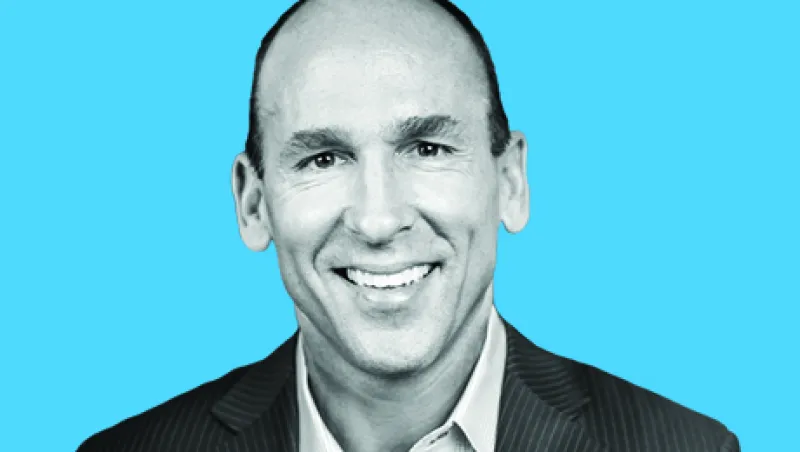There are thousands of financial planners and advisers in the U.S., many of whom help people to save for retirement. But very few of them counsel clients on what to do with their lives after work ends. Scott Hanson, founder and co-CEO of independent advisory firm Hanson McClain, aims to change the way retirees approach those years.
Hanson, 50, got his start in financial planning at Lincoln National Corp., the life insurer now known as Lincoln Financial Group, in 1990 after earning a finance degree from California State University, Chico. At that time, the firm let new advisers earn their Certified Financial Planner designation, and he took advantage of the opportunity. “I thought I’d learn more about financial planning,” Hanson recalls, “and it seemed like the wire houses at the time were all about making cold calls.”
But the entrepreneurial bug soon reclaimed Hanson, who had run a tree-trimming business as a college student. In 1993, with a colleague from Lincoln named Patrick McClain, he launched his own firm. Today, Hanson McClain has 70 employees and manages $2 billion for more than 4,000 clients; it also operates a separate nationwide financial adviser network with $1.5 billion in assets under advisement.
Hanson recently visited Institutional Investor’s New York offices to chat with Senior Writer Frances Denmark about what he’s learned over the years and his vision for a new model of retirement planning.
How did Hanson McClain first gain traction?
Times were lean in the beginning, but then we got a little lucky. A chiropractor whom I had sold a term life insurance plan to while at Lincoln National called me to ask if I could help his wife, who had received a retirement offer at Pacific Bell. AT&T and Pacific Bell were downsizing in the 1990s as technology changed and the effects of competition in telecom increased. I realized that a lot of people were leaving — tens of thousands would ultimately over the next 20 years — and they didn’t know what to do about their early retirement.
Depending on when somebody retires — which day, which quarter — it could have a big impact on their retirement. There were also different kinds of offers, so it was hard for people to figure out which was best for them. We created spreadsheets to help people figure that out and started an education program. Local brokerage houses had a different, product sales approach that differentiated us. Soon other independent advisers around the state of California were interested in using our techniques with telecom retirees in their region, so we started the Hanson McClain Retirement Network. At one time, there were 400 advisers nationally, but we’ve stopped recruiting and are down to 40, including some of the original group.
Has the telecom pension issue changed in recent years?
No, this issue hasn’t changed in 25 years. The spin that companies put on their retirement plans, and even the medical plans, are not necessarily in the best interest of the employees. Anytime a company tries to save costs somewhere, they always put a positive spin on it to the employees. We cut through that and ask, “What’s the real story here?”
Besides establishing a niche with telecom retirees, how else have you attracted new business?
We started a radio program in 1995 called Money Matters and are about to celebrate our thousandth episode. Back then we met with Ron Carson, founder of Carson Wealth Group in Omaha, Nebraska, who recommended this approach. We came home and talked our way onto a local radio station. One thing that always strikes me is that people who have complex financial problems would call a stranger on a radio program to get a four-minute answer. I sometimes think, “Is it that difficult to find a trusted financial adviser?”
How has your view of retirement changed?
As we delved further into what retirement looks like and what needs our clients have, we began to view retirement differently. A lot of the telecom retirees retired relatively early, so I’ve had 20 years to observe them. A good financial adviser tries to help people find clarity in what their plans are for their lives so they can develop financial plans and investment tools to meet those goals. But most people don’t have much idea of what their life is going to look like. The financial services industry paints retirement as sitting on a beach or playing golf every day. But we are finding that it’s not great to live your life that way all the time for the next 25 years, even if you could afford that lifestyle.
How is your model of retirement planning evolving?
It’s not how many days you can golf or fish or whatever your hobbies are. It’s the interactions we have with others and contributing to the lives of others, having purposeful commitments, whether through volunteer or paid work or a new career. Someone who is 65 today can expect to live until their late 80s. But there’s not much science or data out there that helps us to figure it out when we are 60 years old. A 2014 study from Merrill Lynch said that 72 percent of those over age 50 want to continue paid employment in retirement in “new, more flexible and fulfilling ways.” And it’s not because they all need the money. In fact, the higher percentage of those working are the more educated and wealthy people.
To dig deeper into future retirement needs, we did a project with MBA students at the University of California, Davis, and hired a research company that used a 30-year longitudinal study from the University of Michigan. I think the employment marketplace is going to shift to a gig economy for retirees and older people are going to have more opportunities to work in the future. I envision retirement counselors helping retirees just like career counselors do with workers in early or midcareer. We’re still in the early stages of this, but it’s pretty exciting.
Follow Frances Denmark on Twitter at @francesdenmark.






